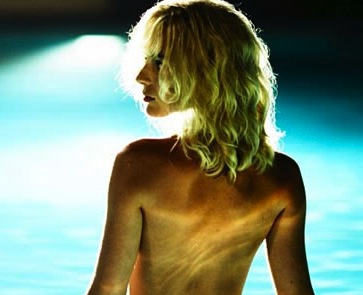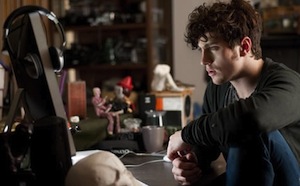Films for me have always been an opportunity to travel around the world and into situations that will never be part of my real life experiences. I can go backwards and forwards in time or even into a dimension of virtual reality.
In the best films, the virtual reality is into another person’s psyche, experiencing the world through someone else’s eyes. This year, at the Cannes Film Festival, there are a few titles that reflect the phenomenon of “second lives” or online avatars (that don’t involve tall blue creatures).
 Complexity in emotional revelations they are not, but they do grapple with themes of this popular technological creation. The characters in these dramas are young and much of what might have been done as expensive special effects in a fantasy film, are now part of the CGI video game-look that can represents the film’s VR sequences. Let’s take a look.
Complexity in emotional revelations they are not, but they do grapple with themes of this popular technological creation. The characters in these dramas are young and much of what might have been done as expensive special effects in a fantasy film, are now part of the CGI video game-look that can represents the film’s VR sequences. Let’s take a look.
From the Netherlands is director David Verbeek’s Un Certain Regard entry, “R U There,” the story of a professional gamer who travels the world to compete in video game tournaments. In Taipai his arm begins to hurt (presumably a consequence of too much gaming), so he finds a massage from a girl in the hotel whom his friends had pegged earlier in the evening as a prostitute.
Despite the fact that his new massage therapist/love interest tells him that she relaxes by playing in the “Second Life” world, a real world connection begins to develop between Jitze the gamer and the young woman. Since gaming the complexities of gaming is absolutely not my world, it was momentarily interesting to watch the gaming team practice and go about the usual warm up and bonding rituals a regular sports team would engage in (despite the fact that any sweat broken is more likely anxiety than physical exertion) or to see Jirwi witness the real life violence of a moped accident and the death of the driver after hours of playing some high-body count computer war game.
 The film didn’t sustain my interest, but it might captivate a young audience that could relate to losing touch with the real world by spending endless hours on their computers engaged in solitary activities. An engaging romp like Gregg Araki’s college comedy/sci fi film “Kaboom,” it is not. Those college kids are more inclined to use the internet to confirm a “hook-up” than grab a Wii control.
The film didn’t sustain my interest, but it might captivate a young audience that could relate to losing touch with the real world by spending endless hours on their computers engaged in solitary activities. An engaging romp like Gregg Araki’s college comedy/sci fi film “Kaboom,” it is not. Those college kids are more inclined to use the internet to confirm a “hook-up” than grab a Wii control.
“Black Heaven” (“L’Autre World”) from French filmmaker Gilles Marchand (“Who Killed Bambi?”) is another virtual reality techno-thriller with much more action in it than tweaking a joystick with one arm that goes numb and much better, nourish stylized computer graphics, but it still doesn’t deliver. The “Mulholland Drive”/”Twin Peaks”-ish plot does find a believable femme fatales in a bleach blonde Louise Bourgoin who manages to be both mysterious and fatale amongst a cast otherwise delivering mediocre performances.
Bourgoin might be the most under-utilized working French actress today. She also put in the most interesting performance in “The Girl From Monaco” which I caught at last year’s City of Lights, City of Angels Film Festival in Los Angeles. Now if she could just get a part in a good movie …
Plot involves a young man who, with his sweet and innocent, Laura Dern in “Blue Velvet” type girlfriend, finds a cell phone (standing in for David Lynch’s ear in “Blue Velvet”) when they are having a smooch in a public beach bathroom in the South of France. The phone leads them to a “Blue Velvet” type dark and seamy adult mystery which even includes (within the world of the game “Black Hole”) Sam (Bourgoin) torch singing as her VR avatar, just like Isabella Rossellini in what else – “Blue Velvet.”
 Young Gaspard (Grégoire Leprince-Ringuet), the protagonist is desperate to get in sexy Sam’s pants in real-life as she starts to fall for his mature avatar. But all she really wants is a nice man to commit suicide with. Did I mention that she also lives in or has access to a very cool modern house that surprisingly does not reference “Blue Velvet” – its much more “Mulholland Drive.” I was waiting for a dwarf to pop up, but alas, Marchand must be saving the dwarf in the red suit for “Black Heaven 2.” The M83 mastermind Anthony Gonzalez is responsible for the score.
Young Gaspard (Grégoire Leprince-Ringuet), the protagonist is desperate to get in sexy Sam’s pants in real-life as she starts to fall for his mature avatar. But all she really wants is a nice man to commit suicide with. Did I mention that she also lives in or has access to a very cool modern house that surprisingly does not reference “Blue Velvet” – its much more “Mulholland Drive.” I was waiting for a dwarf to pop up, but alas, Marchand must be saving the dwarf in the red suit for “Black Heaven 2.” The M83 mastermind Anthony Gonzalez is responsible for the score.
“Chatroom,” a U.K. production from director Hideo Nagata is described in the official Cannes Film Festival synopsis as “exposing the chilling reality of what happens when the lines between reality and cyberspace become blurred …” Apparently this film too shows the darker side of the internet, depicting a teen who uses the chatroom to lure peers to commit suicide.
I missed this one, but here is a review from Mike D’Angelo at the AV Club which pretty much sums up the on the street reviews I got when I bumped into colleagues who had seen it: "Hideo Nakata’s laughably dated ‘Chatroom’ finds a quintet of annoying British teens, including ‘Kick-Ass” Aaron Johnson, gathering in virtual reality to humiliate and abuse one another from the comfort of their individual laptops … Shrill and insipid, ‘Chatroom’ doesn’t work on any level — the dialogue is risible, the character dynamics are preposterous, and the rise of Chatroulette makes the entire concept of a tight-knit virtual community seem like a sad anachronism."
One starts to wonder about the relevancy of this thematic, when apparently David Lynch already made the best “virtual reality thriller” sans computer, back in 1986. Does spending plentiful amounts of time on the internet make teens alienated or likely to commit anti-social acts of violence or is this a 21st century mythology?
Probably, they were just weird, maladjusted kids to begin with. The psychopath in “The Tender Son, The Frankenstein Project” (the Hungarian Competition film that premiered Saturday) doesn’t go anywhere near a computer and look what he does.
We can only hope that at least the next attempt at a VR film involving teens is directed by Larry Clark.


